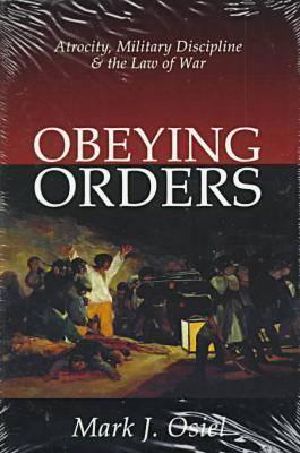Obeying Orders · Atrocity, Military Disipline, and the Law of War

- Authors
- Osiel, Mark
- Publisher
- Transaction Publishers
- ISBN
- 9781560004073
- Date
- 1999-03-19T00:00:00+00:00
- Size
- 0.87 MB
- Lang
- en
A soldier obeys illegal orders, thinking them lawful. When should we excuse his misconduct as based in reasonable error? How can courts convincingly convict the soldier's superior officer when, after Nuremberg, criminal orders are ex-pressed through winks and nods, hints and insinuations? Can our notions of the soldier's -due obedience, - designed for the Roman legionnaire, be brought into closer harmony with cur-rent understandings of military conflict in the contemporary world? Mark J. Osiel answers these questions in light of new learning about atrocity and combat cohesion, as well as changes in warfare and the nature of military conflict.
Sources of atrocity are far more varied than current law as-sumes, and such variations display consistent patterns. The law now generally requires that soldiers resolve all doubts about the legality of a superior's order in favor of obedience. It ex-cuses compliance with an illegal order unless the illegality--as with flagrant atrocities--would be immediately obvious to any-one. But these criteria are often in conflict and at odds with the law's underlying principles and policies. Combat and peace op-erations now depend more on tactical imagination, self-disci-pline, and loyalty to immediate comrades than on immediate, unreflective adherence to the letter of superiors' orders, backed by threat of formal punishment. The objective of military law is to encourage deliberative judgment. This can be done, Osiel sug-gests, in ways that enhance the accountability of our military forces, in both peace operations and more traditional conflicts, while maintaining their effectiveness.
Osiel seeks to -civilianize- military law while building on sol-diers' own internal ideals of professional virtuousness. He re-turns to the ancient ideal of martial honor, reinterpreting it in light of new conditions, arguing that it should be implemented through realistic training in which legal counsel plays an en-larged role rather than by threat of legal prosecution. Obeying Orders thus offers a compelling answer to the question that has most haunted the moral imagination of the late twentieth cen-tury: the roots--and restraint--of mass atrocity in war.